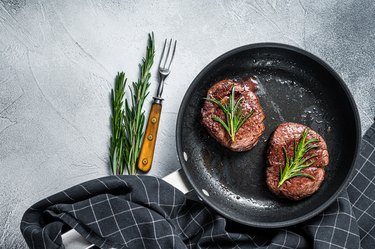
"Filet mignon" might sound fancy, intimidating and impossible to pull off as a home chef, but we promise you don't have to go to a Michelin-starred restaurant to get a flavorful steak cooked to perfection.
Filet mignon is cut from the middle of the cow — specifically, from the smaller end of the tenderloin, which sits between the rib and the sirloin (the back of the cow). This cut represents around 2 to 3 percent of the total cow, which is why it's so expensive, per Omaha Steaks.
Video of the Day
Video of the Day
A 3-ounce serving of grilled beef tenderloin steak contains 168 calories, 26 grams of protein and 7 grams of fat, per the USDA. It's exceptionally tender despite being rather lean.
Keep reading to learn how to cook filet mignon at home by any and every method imaginable, no matter whether you want your steak broiled, roasted or even George Foreman-grilled. We've also included all the important safety information you'll need, such as the internal temp for filet mignon.
How to Defrost Filet Mignon
Filet mignon is a pricey cut of beef, so don't throw your money away with improper thawing.
There are three ways to thaw filet mignon: in the refrigerator, in cold water and in the microwave, per the USDA.
Refrigerator defrosting takes the longest, but the slow, gentle thawing preserves the meat's silky texture and is considered the best method, per Chicago Steak Company. Cold-water defrosting works quickly thanks to the steak's small size and is less harsh than the microwave. Defrosting in the microwave only takes a few minutes, but it can sometimes cause the meat to become tough and stringy.
Put simply: The fastest way to thaw steak is in the microwave, but the best way to thaw steak for the best texture is in the refrigerator.
Refrigerator Method
Step 1: Place the frozen filet mignon in its original packaging on a plate in a single layer.
Step 2: Put the plate in the refrigerator on the bottom shelf (so the juices don't drip on other food in the fridge).
Step 3: Allow the meat to defrost until it's soft and pliable, which will take at least 24 hours. Cook within 3 to 5 days of thawing.
Cold Water Method
Step 1: Place the frozen filet mignon in a large bowl. If the meat's original packaging isn't waterproof, seal it in a zip-top plastic bag before thawing.
Step 2: Fill the bowl with cold tap water. If necessary, place a glass or bowl on top of the meat to weigh it down so it remains submerged.
Step 3: Change the water every 30 minutes until the meat is thawed completely, which may take one hour to a few hours.
Meat that is thawed in cold water should always be cooked right away. Do not store and cook it later.
Microwave Method
Step 1: Remove the frozen filet mignon from its original packaging and transfer it to a microwave-safe dish.
Step 2: Place the steak in the microwave.
Step 3: Microwave the meat on the "defrost" setting until it is soft and thawed, which may take 5 to 10 minutes depending on the size of the steak. Check the meat's progress every couple minutes to prevent overcooking.
Meat that is thawed in the microwave should always be cooked right away. Do not store and cook it later.
Filet Mignon Food Safety
Making sure your steak is properly cooked is extremely important. While many people think meat that is a pink hue is less cooked and a steak that's browner in color is more well-done, this isn't a reliable indicator of its safety. You can't tell if a food is safe by sight, smell or taste, per the Academy of Nutrition and Dietetics.
Instead, you should measure a steak's internal temperature with a meat thermometer to ensure it's not only delicious but also safe to eat. At a minimum, your beef steak should reach an internal temperature of at least 145 degrees Fahrenheit and sit for 3 minutes before serving, per the Academy of Nutrition and Dietetics.
The way you handle leftovers can also be a food safety issue: You should promptly refrigerate the meat to reduce the risk of harmful bacterial growth. Throw away any meat that has been at room temperature for more than 2 hours, per the USDA.
Tip
It is not recommended to cook a filet mignon above an internal temp of 155 degrees Fahrenheit, as this will decrease the natural tenderness of the meat.
How to Roast Filet Mignon
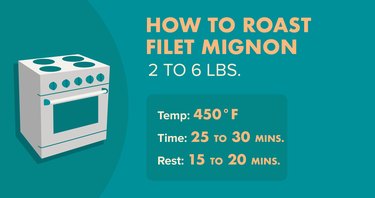
Here's how to cook a whole filet mignon in the oven, per Kansas City Steaks.
Things You'll Need
2- to 6-pound whole filet mignon
shallow roasting pan
meat thermometer
butter
your choice of seasoning
aluminum foil
carving board
Step 1: Take the filet mignon roast out of the refrigerator and allow it to rest until it comes to room temperature, about an hour.
Step 2: Preheat the oven to 450 degrees Fahrenheit for a 2- to 6-pound whole filet mignon.
Step 3: Rub the steak with butter and seasoning (see our marinade and rub recommendations below) — note that it doesn't need a thick coating of dry rub.
Step 4: Find a shallow roasting pan. Put the whole filet mignon in the center of the pan with the fattier side of the meat facing up.
Step 5: Place the pan into the oven and shut the door. Roast until a meat thermometer registers 145 degrees Fahrenheit for medium doneness (about 25 to 30 minutes).
Step 5: Transfer the roast to a carving board and tent (cover) it loosely with aluminum foil. Let it rest for 15 to 20 minutes before carving. The temperature of the meat will rise by as much as 10 degrees during this time, and the juices will redistribute evenly throughout.
Tip
When you check your meat to see if it's done, don't cut into the meat because the delicious juices will escape. Instead, press down on the meat: If your (clean!) finger leaves an impression and the meat feels very soft, it's rare. If it feels soft and supple, it's medium-rare. If it feels firm to touch, it's overdone.
That said, it's always best to take the temperature of your meat with a thermometer to make sure it's at least 145 degrees Fahrenheit.
How to Broil Filet Mignon
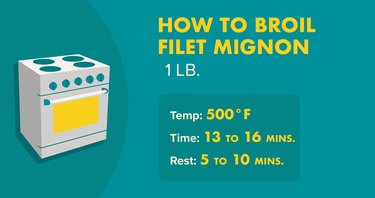
Broiling filet mignon is easy with this recipe from the Minnesota Beef Council.
Things You'll Need
steak
salt
garlic
parsley
small mixing bowl
broiler pan
Step 1: Prepare your steak to your preferences (see our marinade and rub recommendations here).
Step 2: Turn on the broiler (or set the oven high at 500 degrees and leave the oven door open a crack so it doesn't overheat).
Step 3: Place the prepared steaks in a broiler pan. How long to broil filet mignon depends on your done-ness preferences: For a medium-rare steak, broil for about 13 minutes. For a more medium temperature, keep it in the broiler for closer to 16 minutes. In each case, turn the steak over about halfway through the cooking process.
Step 4: When the broiled beef tenderloin has about a minute left to cook, you can add your favorite ingredients to the top of the steak. Popular toppings include blue cheese, minced onion and ground white pepper.
Step 5: Let the steak rest for 5 to 10 minutes before serving.
How to Cook Filet Mignon on the Stovetop
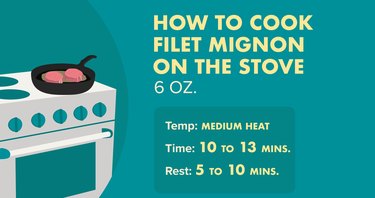
This stovetop steak recipe comes from the Cattlemen's Beef Board and National Cattlemen's Beef Association.
Things You'll Need
steak
nonstick skillet
meat thermometer
salt
pepper
Step 1: Heat a large nonstick skillet over medium heat. Place steaks in the skillet and cook for 10 to 13 minutes, turning occasionally.
Step 2: Insert a food thermometer into the center of the steak. Medium-rare is 145 degrees Fahrenheit and medium is 160 degrees Fahrenheit. To cook filet mignon well-done, make sure it reaches 170 degrees Fahrenheit.
Step 3: Remove the steak to a platter and season with salt and pepper. Let it rest for 5 to 10 minutes. Serve with additional ingredients such as cooked mushrooms and shallots, if desired.
How to Grill Filet Mignon
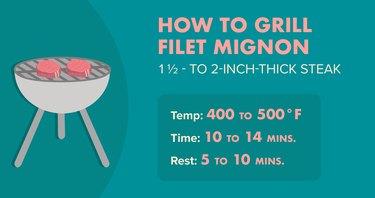
Here's how to grill thick filet mignon — whether it's a 1 1/2-inch or 2-inch filet mignon — for summer days when you fire up the grill. Read on for how to grill filet mignon at your next outdoor cookout, per Weber.
Things You'll Need
1 1/2 to 2-inch-thick steak
kosher salt
meat thermometer
Step 1: Remove filets from the fridge so they reach room temperature.
Step 2: Lightly brush with olive oil and add your seasonings, including salt.
Step 3: Preheat grill to 450 to 500 degrees for 15 minutes and clean coking grates with grill brush.
Step 4: Grill the steak over direct high heat with the lid closed for 6 to 8 minutes, turning once.
Step 5: Move the filets over to indirect heat for an additional 4 to 6 minutes or until your desired degree of doneness. Medium rare is 125 to 135 degrees.
Step 6: Let the meat rest on a plate for 5 to 10 minutes before cutting into it. The juices will settle during resting, which prevents them from seeping out while you're trying to enjoy a moist steak.
Related Reading
On a George Foreman Grill
The George Foreman grill is a countertop grill that cooks from the top and the bottom at the same time, making it a quick process to cook a steak filet. A 1-inch thick filet cooks in 7 to 12 minutes, depending on the doneness you prefer. A filet mignon on a George Foreman grill makes for a quick meal at home after a busy day. Experiment with seasonings and marinades to find a recipe you prefer.
Here's how to make a George Foreman filet mignon and the cooking time you should keep in mind.
Things You'll Need
George Foreman grill
1-inch-thick steak
cooking spray
red wine vinegar
olive oil
kosher salt
black pepper
Step 1: Place the filet on the counter to warm for about 20 minutes before cooking it on the Foreman grill.
Step 2: Plug in the Foreman grill and let it heat until the indicator light on the top panel turns off, about 5 minutes. The grill does not have an on/off switch; plugging it in turns it on.
Step 3: Spray the top and bottom cooking surface on the Foreman grill with cooking spray.
Step 4: Butterfly-cut the steak so that it's about 3/4 inch thick each. Coat it with a mixture of red wine vinegar, olive oil, kosher salt and fresh ground pepper.
Step 5: Set the Foreman grill drip pan under the front edge of the grill to catch juices and fat drippings from the meat.
Step 6: Cook the filet for a total of 6 to 9 minutes for medium-rare, but check it after 4 minutes.
Step 7: Insert a meat thermometer into the center of the filet to verify the internal temperature is at least 145 degrees Fahrenheit.
How to Sear and Bake Filet Mignon
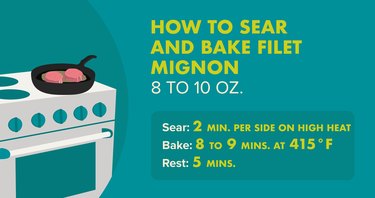
When prepared properly, oven-baked filet mignon is so tender that it can be cut with a fork. Searing the filet first will seal in the juices while finishing it in the oven will ensure the tenderness of the meat upon completion of cook time — and this method is the best way to cook filet mignon indoors.
Step 1: Preheat the oven to 415 degrees Fahrenheit.
Step 2: Sear filets with butter or oil for 2 minutes per side on the stovetop using a cast-iron skillet on high heat.
Step 3: Transfer to the oven and cook for about 8 to 9 minutes to reach a temperature of at least 145 degrees Fahrenheit.
Step 4: Let the steak rest for 5 minutes before cutting it.
How to Make Bacon-Wrapped Filet Mignon
Bacon brings extra flavor and helps maintain moisture. All you need for a perfectly prepared bacon-wrapped filet mignon is a pan (a cast-iron skillet is the standard) and a hot oven.
While there are a variety of methods of cooking these tasty steaks, one particularly common method is preparing them in a grill pan. Filet mignon is typically lean, and bacon strips will help the meat retain its natural juices.
Regardless of the method you choose, the things you'll need to make bacon-wrapped steak are the same.
Things You'll Need
steak
bacon
kosher salt
black pepper
olive oil
butter
pan
tongs
toothpicks
How to Cook Bacon-Wrapped Filet Mignon in a Skillet
Step 1: To make bacon-wrapped steak in a skillet, wrap the bacon around each steak, letting the bacon overlap by only 1/4 inch or so.
Step 2: Trim off any excess and wrap kitchen string around the middle of the bacon and tie off.
Step 3: Sprinkle the top and bottom of steaks with kosher salt and coarse black pepper.
Step 4: Heat olive oil in a heavy skillet over medium-high heat until hot but not smoking.
Step 5: Using tongs, add the steaks to the skillet and let them cook untouched for 3 or 4 minutes or until they release easily.
Step 6: Turn the steaks and immediately transfer the skillet to a preheated 425-degree oven and cook for an additional 10 minutes for medium-rare and up to 15 for well-done.
Step 7: Serve immediately with pan juices.
How to Cook Bacon-Wrapped Filet Mignon in a Grill Pan
While there are a variety of methods of cooking these tasty steaks, one particularly common method is preparing them in a grill pan. Filet mignon is typically lean, and bacon strips will help the meat retain its natural juices.
Here's how — and how long — to cook filet mignon in a grill pan.
Step 1: Brush or drizzle a grill pan with a light coating of olive oil, which will keep the steak from sticking to the pan. Set the stovetop to high and heat the grill pan.
Step 2: Sprinkle black pepper onto a plate. Coat each side of the filets, adding salt to taste.
Step 3: Wrap the outer edges of the filets in strips of uncooked bacon. Secure the bacon onto the filets' edges with water-soaked toothpicks.
Step 4: Place the steaks onto the heated grill pan. Sear the filets for 4 to 7 minutes, then flip with tongs and cook for another 4 to 7 minutes until at least 145 degrees Fahrenheit.
Step 5: Remove the steaks from the grill pan, using tongs. Allow them to sit for 3 minutes, which will give the flavors time to settle into the beef. Serve with your choice of garnishes and sides.
Tip
You can also fry the steaks until they are brown to dark brown and then finish them in the oven by cooking them for 2- to 3-minute intervals at 400 degrees Fahrenheit until they're at 145 degrees Fahrenheit. Allow to rest for 3 to 4 minutes before serving.
What About Slow Cooking Filet Mignon?
While "slow cooker filet mignon" might sound like an appealing method for "set it and forget it" steak, you should not cook steak slowly because the longer it cooks, the drier it gets. Slow cooking causes the connective tissue in your steak to gelatinize and turn gray.
Cook it fast and on high heat regardless of your cooking method.
Filet Mignon Marinade and Rub Options
Follow these simple steps to create a marinade or rub for your filet mignon, per Kansas City Steaks. Doing so improves the texture and flavor of your steak.
Filet Mignon Marinade
Things You'll Need
glass dish
mixing bowl
garlic
thyme
pepper
salt
lemon juice
olive oil
Worcestershire Sauce
soy sauce
cayenne pepper
Step 1: Combine all the ingredients in a medium mixing bowl.
Step 2: Place the steak in a glass dish and add the marinade, coating the steak evenly.
Step 3: Refrigerate it for 3 to 4 hours.
Step 4: Remove the filet 1 hour before you plan to cook it.
Filet Mignon Rubs
Ingredients
- herbs and spices
- salt and pepper
- brown sugar
- chili powder
Make a dry rub by combining a blend of herbs and spices that suit your taste or the flavor of the dish. Use a bit of salt and pepper for the simplest version of a dry rub. Add brown sugar to your dry rub for a sweet flavor, or add chili powder to make it spicy.
Ingredients
- paprika
- dry mustard
- garlic powder
- onion powder
- celery salt
- chipotle powder
Alternatively, make a beef rub with ingredients like paprika, dry mustard, garlic powder, onion powder, celery salt and chipotle powder. Feel free to experiment with what flavors work best for the dish you're preparing.
- MyFoodData: "Grilled Beef Tenderloin Steak"
- U.S. Department of Agriculture: "How do you thaw food safely?"
- Chicago Steak Company: "How to Thaw Steak: One of Your Most Pressing Questions, Answered"
- Kansas City Steaks: "How to Cook a Beef Tenderloin Roast"
- Minnesota Beef Council: "Beef Tenderloin Steaks with Blue Cheese Topping"
- Cattlemen’s Beef Board and National Cattlemen’s Beef Association: "Filet Mignon With Herb-Butter Sauce and Mushrooms"
- Our Everyday Life: "How to Cook a Bacon-Wrapped Filet Mignon on a Stovetop Grill Pan"
- How to Cook Meat: "Bacon-Wrapped Filet Mignon"
- Foreman Grill Recipes: "Easy Grilled Beef Tenderloin Recipe"
- Kitchen Swagger: "Pan-Seared Filet Mignon Recipe"
- CookFiletMignon.com: "How to Cook Filet Mignon"
- Epicurious: "How to Marinate Steak Without a Recipe"
- Food Fire Friends: "How to Make a Dry Rub – For Beef, Pork, Chicken, and All Meats"
- Academy of Nutrition and Dietetics: "A Short Guide to Food Thermometers"
- U.S. Food & Drug Administration: "Serving Up Safe Buffets"